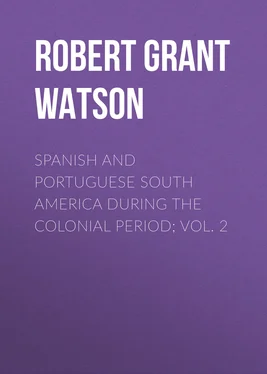Robert Grant Watson - Spanish and Portuguese South America during the Colonial Period; Vol. 2
Здесь есть возможность читать онлайн «Robert Grant Watson - Spanish and Portuguese South America during the Colonial Period; Vol. 2» — ознакомительный отрывок электронной книги совершенно бесплатно, а после прочтения отрывка купить полную версию. В некоторых случаях можно слушать аудио, скачать через торрент в формате fb2 и присутствует краткое содержание. Жанр: foreign_prose, История, foreign_edu, foreign_antique, на английском языке. Описание произведения, (предисловие) а так же отзывы посетителей доступны на портале библиотеки ЛибКат.
- Название:Spanish and Portuguese South America during the Colonial Period; Vol. 2
- Автор:
- Жанр:
- Год:неизвестен
- ISBN:нет данных
- Рейтинг книги:3 / 5. Голосов: 1
-
Избранное:Добавить в избранное
- Отзывы:
-
Ваша оценка:
- 60
- 1
- 2
- 3
- 4
- 5
Spanish and Portuguese South America during the Colonial Period; Vol. 2: краткое содержание, описание и аннотация
Предлагаем к чтению аннотацию, описание, краткое содержание или предисловие (зависит от того, что написал сам автор книги «Spanish and Portuguese South America during the Colonial Period; Vol. 2»). Если вы не нашли необходимую информацию о книге — напишите в комментариях, мы постараемся отыскать её.
Spanish and Portuguese South America during the Colonial Period; Vol. 2 — читать онлайн ознакомительный отрывок
Ниже представлен текст книги, разбитый по страницам. Система сохранения места последней прочитанной страницы, позволяет с удобством читать онлайн бесплатно книгу «Spanish and Portuguese South America during the Colonial Period; Vol. 2», без необходимости каждый раз заново искать на чём Вы остановились. Поставьте закладку, и сможете в любой момент перейти на страницу, на которой закончили чтение.
Интервал:
Закладка:
1632.
The Dutch had now been for two years at Recife ; but their conquests were confined to the possession of that place and to a fort on the island of Itamaraca . A gleam of good fortune, however, now awaited them. A mulatto named Calabar, a native of Pernambuco , for some reason not known, deserted to the invaders. He was possessed of such sagacity and enterprise, and moreover was so well acquainted with the country, that his assistance was invaluable. Although he had been the first to desert, he was soon the means of inducing others to follow his example. His earliest exploit was to lead the Dutch on an expedition to Garrasu , which place he surprised whilst the inhabitants were at mass. They plundered and burnt the town, treating the people with much cruelty.
Before the alarm occasioned by the fate of Garrasu had cooled down, Calabar next led the Dutch on a second expedition to the south, where they destroyed another settlement. He then guided them to the river Fermoso , and surprised five ships nearly laden. On the Portuguese building a little fort here to prevent the recurrence of a similar disaster, Calabar once more attacked the place, when the commander and nineteen out of the twenty men of the garrison fell in its defence. Indeed, Calabar completely embarrassed his late commander, whose every plan was thwarted, and who was utterly at a loss what to do. His measures were so uniformly unsuccessful that he did not escape from his countrymen the suspicion of treachery, though he may be acquitted of anything further than incapacity.
The results of this warfare were so meagre and its progress so slow, that the West India Company now resolved upon the step of sending out two commissioners with full powers to decide as to its continuance or otherwise. They brought with them fresh stores and three thousand men. As the chances of the war were now in their favour, they resolved to pursue it. They did so with vigour; and, having gained some successes, determined to attack the camp. The attempt was made on Good Friday, when it was supposed that the Portuguese would be employed in religious ceremonies. Three thousand men advanced under the Dutch commander Rimbach; but they were received by a hot fire, by which Rimbach himself fell, and were forced to retreat in great disorder. The next attempt of the invaders was upon the island of Itamaraca , in which they were this time successful. The loss which the Portuguese thus repeatedly sustained was not made up to them by reinforcements, and their whole force had now dwindled to twelve hundred men. This state of things suggested to the Dutch commissioners the idea of winning the camp by siege. The natural difficulties of the country, however, put an end to this plan so soon as it was attempted to put it into execution.
The indefatigable Calabar next projected an expedition to a greater distance, namely, to some lagoons forty-six leagues to the south of Recife . The object appears to have been merely to create terror amongst the inhabitants; and the Dutch ere long perceived the impolicy of ravaging a country which it was their object to possess. It was their good fortune to intercept a small squadron and a supply of stores, sent from Lisbon to the relief of the Portuguese. After a struggle, one of the Portuguese men-of-war was driven on shore, the men, the guns, and part of the cargo being saved; but the other man-of-war was sunk. The commander of the first Portuguese vessel received orders to embark his men at Cunhau , where four vessels would be ready to receive them. These, however, had scarcely got under weigh when the Dutch were upon them. Three were burnt; the fourth was taken. This affair proved one of the greatest losses which the Portuguese suffered during the entire expedition. Of the six hundred men sent out, but one hundred and eighty reached the camp.
The next attempt made by the Dutch was against Rio Grande , their guide, as usual, being Calabar. The fortress was defended by thirteen guns; but it was commanded by a sand-hill, to which Calabar led the besiegers. Rio Grande fell almost immediately; and five hundred men, who arrived from Paraïba to its assistance, had the mortification of seeing the Dutch flag flying over its walls. Indeed, the Dutch were now victorious on all sides; for they had, by means of emissaries, been able to rouse against the Portuguese the Tapuyas , a barbarous tribe who had been driven by the latter into the interior, and who now took a merciless vengeance upon their women and children; and the Portuguese were still further harassed by a collection of negroes, who had from time to time escaped from slavery, and who had settled in a tract of country called the Palmares .
1634.
In February 1634 the Dutch commander quitted Recife , leaving that place with so diminished a force that Albuquerque determined to attempt to surprise it—an attempt which only failed owing to the lukewarmness with which it was carried out. The Dutch had gone in force to Paraïba , their object being to get possession of St. Augustines , the point at which stores and troops for Brazil usually landed, and whence much of the produce of Pernambuco was shipped. Having thrown the Portuguese off their guard by a feint, the Dutch proceeded along the coast to a place called Pedras . Eleven of their vessels ran in across the bar, whilst they were followed through an opening in the reef by the launches with Calabar and a thousand men on board. The port of Pontal was now in the possession of the Dutch, but as the bar was still commanded by the Portuguese, the former could only communicate with their main force outside by means of the opening in the reef by which Calabar had entered.
Albuquerque and his general arrived ere long from the camp with three hundred men, and, having collected a force of eight hundred, proceeded to attack the Dutch in the town. The latter were thrown into confusion, and the Portuguese would have easily regained Pontal but for a party of their own men who were sent to surprise the Dutch by attacking them on the flank, but who surprised their comrades instead. The Portuguese, however, were in such strength that their opponents could not push their advantage against them. Indeed, the Portuguese general felt confident that the Dutch ships in port must fall into his hands; but he had not realized the resources of their ingenuity. Although it was impossible for them to escape without loss over the bar as they had entered, they were yet enabled to enlarge the opening in the reef sufficiently to admit of the egress of their vessels. They, however, left a garrison of two thousand men to defend the town of Pontal .
The Dutch at this time were still further reinforced by three thousand five hundred men, the first use made of which was to make a renewed attack upon Paraïba , a flourishing town of about a thousand inhabitants, and having twenty sugar-works in its neighbourhood. Paraïba is situated some three miles up the river of the same name, the entrance of which was commanded by Fort Cabedello . Before this place the Dutch appeared with two thousand four hundred men, and effected their landing without loss. As they were vastly superior to the Portuguese in numbers, they carried all before them, although much bravery and devotion was shown on the side of their opponents. Fort Cabedello fell, and with it Fort St. Antonio on the other side of the river. The inhabitants of Paraïba were now advised to lose no time in retiring with their families. Some of them did so, but the greater number remained, willing to submit to any authority that could protect them, and thus the province of Paraïba fell into the hands of the invaders.
Читать дальшеИнтервал:
Закладка:
Похожие книги на «Spanish and Portuguese South America during the Colonial Period; Vol. 2»
Представляем Вашему вниманию похожие книги на «Spanish and Portuguese South America during the Colonial Period; Vol. 2» списком для выбора. Мы отобрали схожую по названию и смыслу литературу в надежде предоставить читателям больше вариантов отыскать новые, интересные, ещё непрочитанные произведения.
Обсуждение, отзывы о книге «Spanish and Portuguese South America during the Colonial Period; Vol. 2» и просто собственные мнения читателей. Оставьте ваши комментарии, напишите, что Вы думаете о произведении, его смысле или главных героях. Укажите что конкретно понравилось, а что нет, и почему Вы так считаете.












